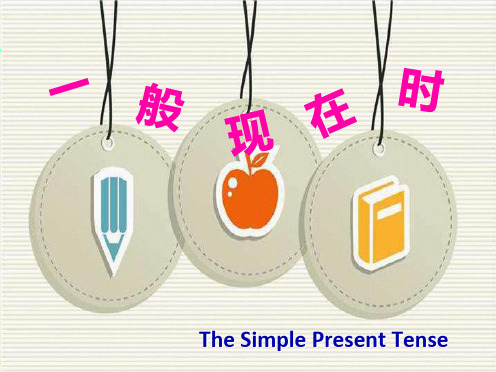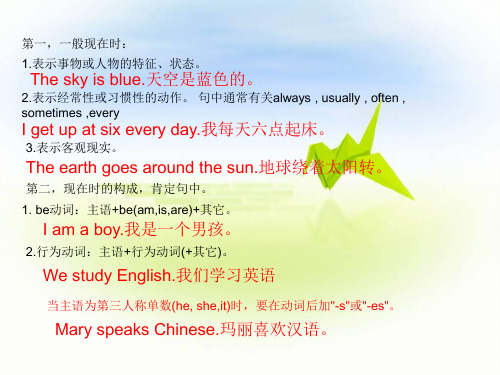一般现在时ppt
一般现在时ppt讲解ppt课件

烧伤病人的治疗通常是取烧伤病人的 健康皮 肤进行 自体移 植,但 对于大 面积烧 伤病人 来讲, 健康皮 肤很有 限,请 同学们 想一想 如何来 治疗该 病人
三、单数可数名词或"this / that / the+单数可数名词"作主 语时,是第三人称单数。
A panda is a shy animal. 熊猫是害羞的动物。 This book is yellow. 这本书是黄色的。 That car is red. 那辆小汽车是红色的。 The cat is black. 这只猫是黑色的。
烧伤病人的治疗通常是取烧伤病人的 健康皮 肤进行 自体移 植,但 对于大 面积烧 伤病人 来讲, 健康皮 肤很有 限,请 同学们 想一想 如何来 治疗该 病人
一般现在时 (否定句)
1、I go to school by bus. 否: I don’t go to school by bus. 2、He goes to school by bus. 否:He doesn’t go to school by bus.
烧伤病人的治疗通常是取烧伤病人的 健康皮 肤进行 自体移 植,但 对于大 面积烧 伤病人 来讲, 健康皮 肤很有 限,请 同学们 想一想 如何来 治疗该 病人
用一般现在时态描 述下your good friend ——Mike
烧伤病人的治疗通常是取烧伤病人的 健康皮 肤进行 自体移 植,但 对于大 面积烧 伤病人 来讲, 健康皮 肤很有 限,请 同学们 想一想 如何来 治疗该 病人
烧伤病人的治疗通常是取烧伤病人的 健康皮 肤进行 自体移 植,但 对于大 面积烧 伤病人 来讲, 健康皮 肤很有 限,请 同学们 想一想 如何来 治疗该 病人
一般现在时 (否定句)
一般现在时ppt课件完整版

不可数名词作主语时,谓语动词用单数 形式。
可数名词单数作主语时,谓语动词也用 单数形式。
例如:Water is essential for life.(水 对生命至关重要。)/ A book is on the table.(一本书在桌子上。)
例外情况总结
当主语为并列主语时,谓语动词的数要与靠近它的主语保持一致。
练习3答案
reads。解析:主语 She 是第三人称单数 ,且时间状语为 on weekends,表示经 常性动作,所以谓语动词要用单数形式 reads。
THANKS
时间状语分类及举例
表示经常性或习惯性的动作
always, usually, often, sometimes
表示现在的状态或特征
now, at present, these days
表示普遍真理或客观事实
in general, as a rule
频率副词分类及举例
01
高频副词
always, constantly, continually
注意区分完全否定和部分否定。完全 否定表示全部否定,而部分否定表示 部分否定。例如,“None of the students passed the exam.”(没 有一个学生通过了考试)是完全否定 ;“Not all of the students passed the exam.”(并非所有学生都通过 了考试)是部分否定。
does he work?等。
动词短语和情态动词的变化规则
03
动词短语中的动词和情态动词后接动词原形,如I can swim,
they often go out等。
02 肯定句结构与用法
主语+动词原形+其他成分
(完整版)一般现在时PPT课件.ppt

7. Tom can not walk fast because he _c_a_r_r_ie_s(carry) a heavy box.
用动词的适当形式填空
1.She ____(go) to school at eight o’clock.
2. He usually _____ up at 17:00.(get )
直接加s
Fly-flies;ห้องสมุดไป่ตู้stay-stays
• 第三节 • 特殊疑问句
• I clean the window at home on Saturdays.
• 1、对主语提问:
• Who cleans the window at home on Saturdays?
• 2、对宾语提问:
Has David got a goal?
7. We have four lessons.(否定句) We don’t have four lessons.
8. Nancy doesn’t run fast (肯定句)
Nancy runs fast. 9. My dog runs fast. 否定句:My dog doesn’t run fast.
5. Danny_s_t_u_d_ie_s__(study) English, Chinese, Maths, Science and Art at school.
6. Mike sometimes g_o__e_s_(go) to the park with his sister.
7. At eight at night, she w__a_tc_hes (watch) TV with his parents. 8. _D_o_e_s_ Mike r_e_a_d_(read) English every day?
初中一般现在时ppt

句型转换 1.My brother works in Shenzhen. ______ ______ your brother ________? 2.One of my classmates comes from Australia. ______ ______ one of your classmates______ _______? 3.He does his homework every day.(否定句) He _______ _______ his homework every day. 4.David wants to see me. _______ ______ David _______ to see? 5.She teaches English in No.8 Middle School. ________ ______ she _______ English? 6.My parents live in Chongqing now. ________ live in Chongqing now? 7.They look very young.(一般疑问句) ______ they _______ very young?
2.实义动词的一般现在时句式:
肯定句:
主语(I/We/You/They)+v.+其他
e.g. We study in a high school.
They have a pet.
否定句:
主语(I/We/You/They)+do+ not+v.+其他
They don’t have a pet.
is
to drink
looks
doesn’t do
doesn’t like
一般现在时课件ppt(共25张PPT)

Jim
➢ Jim plays computer games every Sunday.
➢ He goes to school on foot everyday.
➢ He goes to school on foot everyday.
大家来找茬
He work very late every day. -Does you study English yourself?
She usually eats breakfast at 7:00.
play => plays
go => goes
• 以o, s, sh, ch, x结尾的动词,在词尾加es
She often goes to school at 8:00.
=> teach teaches I go to school every weekday.
She usually eats breakfast at 7:00.
He never eats breakfast.
She often goes to school at 8:00. I go to school every weekday.
My piano is quite new.
The earth moves
box => boxes
fly => flies
• 以辅音字母加y结尾的动词,要先将y变成i,再加 es
*26个字母中除AEIOU五个元音字母外,其余皆为辅音字母
study => studis
guesses
finishes
carries
snows
stops
sees
drives
小学一般现在时-实义动词ppt课件

watches teaches goes does washes brushes
(3)动词末尾y前为辅音:将y改为i加es: study→studБайду номын сангаасes fly→flies carry→carries cry→cries
但在y前如果为元音则直接加s buys says
Mary speaks Chinese.玛丽喜欢汉语。
1. be动词的变化。
否定句:主语+ be + not +其它。 如:He is not a worker.他不是工人。
一般疑问句:Be +主语+其它。 如:
-Are you a student
-Yes. I am. / No, I'm not.
二、变一般疑问句并作肯定和否定 回答。
• 1.He wants a book. • 2. Jimmy washes hands before dinner. • 3. Lisa likes milk very much. • 4. They walk to school. • 5. Lingling and Dandan are 10 years old. • 6. I am Chinese. • 7. Ben is from America.
当主语为第三人称单数时,要用does构成一般疑 问句。如:
- Does she go to work by bike? - Yes, she does. / No, she doesn't.
三.第三人称单数的动词变化规则(只有在第 三人称为主语的肯定句中,动词才用三单式)
(1)多数动词直接加s: runs gets likes takes plays climbs
初中英语一般现在时学习课件(共25张ppt)

Watch TV
I often ( ) TV at 8:00.
my father and I go swimming every sunday
My father and I ( ) swimming every Sunday
we play football every Wednesday
We ( ) football every Wednesday.
•9、要学生做的事,教职员躬亲共做;要学生学的知识,教职员躬亲共学;要学生守的规则,教职员躬亲共守。2021/8/312021/8/31Tuesday, August 31, 2021 •10、阅读一切好书如同和过去最杰出的人谈话。2021/8/312021/8/312021/8/318/31/2021 7:50:25 AM •11、只有让学生不把全部时间都用在学习上,而留下许多自由支配的时间,他才能顺利地学习……(这)是教育过程的逻辑。2021/8/312021/8/312021/8/31Aug-2131-Aug-21 •12、要记住,你不仅是教课的教师,也是学生的教育者,生活的导师和道德的引路人。2021/8/312021/8/312021/8/31Tuesday, August 31, 2021
• You have to believe in yourself. That's the secret of success. 人必须相信自己,这是成功的秘诀。
•
Exercise
• 8.I ( ) a boy. • 9.You ( ) a girl. • 10.He ( ) a teacher.
Homework(家庭作业)
1.将所学内容重新看一遍。 2.当一回小老师,给爸爸妈妈讲解什 么是一般现在时。Fra bibliotek是辅音字母
一般现在时PPT课件

一般现在时一般现在时概念:1、一般现在时通常表示经常发生的动作或存在的状态I am a pupil.We go to school every day Nancy teaches us English.I often help my mother do some washing.He always go to school on foot. Sometimes we play football on Friday afternoon.■,H112、例如表示目前的特点、状爱好。
’:We are good at English.She is insterested in music.My hobby is reading books.・3、表示客观事实、•例如:•We are in the classroom.•Tom's father is a doctor.•The weather is cold in win ter.•They usually play games on Sunday.•He does his homework every day.6/1A often(经常、常常)usually (通常)sometimes (有时)always (总是、一直)every day (每天)7/1A一般现在时的构成: Be 动词的一般现在时1•第一人称单数(1) + am 2•第三人称单数(he/she/it) + is(we/they/you) + are You are a niceboy.—A _ They are busy with their homework every day. 千 I * .. __ — 一 — —ind teacher.3•第二人称单数is a It is cloudy today.8/14名词单数用is,I am = Pm you are=you're he is = he's sheis = she z s it is =it's weare =we're-I »I •theuare =thev J reI用am» You 用are.is连着he, she, it (他她它)。
一般现在时课件ppt

05
一般现在时的练习与巩固
填空练习
总结词
填空练习是巩固一般现在时的一种有效方法,通过填空的情 势,让学生填写正确的动词情势,加深对时态的理解和应用 。
详细描写
在填空练习中,教师可设计一些句子,有意留出空白,让学 生根据上下文语境和时态要求填写正确的动词情势。例如, “I ___(play) basketball every XXXday.”,学生应填写 “play”。
结构
一般现在时的基本结构是 “主语 + 动词 + 宾语” 。
情势
动词采取一般现在时情势 ,即动词原型或第三人称 单数情势。
一般现在时的特点
普遍性
一般现在时适用于描写普 遍存在的现象、事实或习 惯性动作。
客观性
一般现在时强调动作或状 态的客观存在,不受时间 限制。
习惯性
一般现在时用于描写习惯 性、规律性的动作或状态 。
一般现在时的用法
描写现在的动作和状态
描写普遍存在的现象和事实
如“I eat an apple every day.”(我每天 吃一个苹果。)
如“The XXX rises in the east.”(太阳从 东方升起。)
描写习惯性、规律性的动作
如“She goes to work by bus every day.”(她每天乘公交车上班。)
翻译练习
总结词
翻译练习是一种跨语言的练习方式,通过将句子从一种语言翻译成另一种语言,让学生更好地理解和运用一般现 在时。
详细描写
在翻译练习中,教师可提供一些英文句子,要求学生将其翻译成中文。在翻译进程中,学生需要准确把握时态的 转换和应用,确保译文符合中文表达习惯。例如,“He ___(live) in New York.”,正确译文应为“他住在纽约 。”
一般现在时--精品课件(共11张ppt)

1.当主语是 I/We/You/They及名词复数时:
v 肯定句☺主+ 原+...
见
e.g. We study in a high school.
助
They have a kes English.
否定句: 一般疑问句: 肯定回答: 否定回答:
He doesn't like English. Does he like English ? Yes, he does. No, he doesn't.
将下列句子改成否定句,一般疑问句并回答:
1. I speak English. I don’t speak English.
•
13、知人者智,自知者明。胜人者有 力,自 胜者强 。2021/8/12021/8/12021/8/12021/8/18/1/2021
•
14、意志坚强的人能把世界放在手中 像泥块 一样任 意揉捏 。2021年8月1日星期 日2021/8/12021/8/12021/8/1
•
15、最具挑战性的挑战莫过于提升自 我。。2021年8月2021/8/12021/8/12021/8/18/1/2021
Yes, __I__ __d_o_. No, __I __ _d_o_n’_t
2.当主语是He/She/It ,名词单数及不可数名词时:
v 肯定句☺主+ 三单+...
见
e.g. He studies in a high school.
助
Lucy has a dog.
动
v词
否定句☺主+doesn't+ 三单+... , (does not=doesn't)
初中英语语法之一般现在时PPT课件

☺ 一般疑问句: Do+主语(非三单)+v.原形+其他? 肯定回答:Yes, 主语+do. 否定回答:No, 主语+don't. 1) _D_o_ you_s_t_a_y (stay) at home on Saturdays? 2) _D_o_ theyh_a_v_e_(have) sports every day? ☺Does+主语(三单)+v.原形+其他?
如果你接受这份工作,他们将和你谈谈细
15
6、表示格言或警句。 例如:Pride goes before a fall. 骄者必败。 注意:此用法如果出现在宾语从句中, 即使主句是过去时,从句谓语也要用 一般现在时。
16
一般现在时表达方法
主要通过谓语动词的变化和用时间词语来 表示,其中最主要的是谓语动词的变化。 一般现在时动词变化的规则是: 当主语为非第三人称单数,谓语动词用原型。 当主语为第三人称单数,谓语动词用第三人 称单数形式。e.g. 1. We often get up early in the morning. 2. My father often gets up early in the
13
4.普遍真理和自然规律: 1) Two and four is six.
二加四等于六。 2)The moon goes around the earth. 月亮绕着地球转。 3)Ten minus two is eight.十减二 等于八。 4)Light travels faster than sound . 光的速度比声音的速度快。
21
4.以辅音字母+o结尾的词,一般情况是在 词尾加es, 读作[z]
一般现在时(示范课)ppt课件精选全文

精选课件
27
• 3. Daniel enjoys playing computer games.
• (改为一般疑问句并做肯定回答)
Does Daniel enjoy playing computer games?
Yes, he does.
精选课件
28
补充:some、any
• 一般说来,some 用于肯定句中,any 用于 否定句和疑问句中 。
Change the following sentences after the models.
Model 1: I like fish. (meat) I don’t like meat.
Model 2. He likes reading. (writing) He doesn’t like writing.
改疑问句或否定句时,原句里的some要改成any
There are some books on the desk. (改为否定句)
→There aren’t any books on the desk.
→Are there any books on the desk?
精选课件
29
Why not buy some apples? 为什么不买些苹果呢?
精选课件
26
句型转换
• 1. Mr. Green comes from Shanghai. • (改为一般疑问句)
Does Mr. Green come from Shanghai?
• 2. Millie lives in a flat in Beijing. • (改为否定句)
Millie doesn’t live in a flat in Beijing.
- 1、下载文档前请自行甄别文档内容的完整性,平台不提供额外的编辑、内容补充、找答案等附加服务。
- 2、"仅部分预览"的文档,不可在线预览部分如存在完整性等问题,可反馈申请退款(可完整预览的文档不适用该条件!)。
- 3、如文档侵犯您的权益,请联系客服反馈,我们会尽快为您处理(人工客服工作时间:9:00-18:30)。
seldom (不常), never(从不)。
频率副词在句中的位置: 1. 频率副词用在be动词后。 It is usually hot in summer. 2. 频率副词用在实义动词前。 My father usually walks home. 3. 频率副词用在助动词与实义动词之间。 I will always love you.
一般现在时
The earth goes I go to school around the sun. every day.
She is a policewoman.
一、一般现在时的定义:
1.客观真理或不 2.经常、反复发生 可变更的事实 的动作
3.存在的状态
4.主将从现: 在时间状语从句和条件状语从句中,如果 主句是一般将来时,从句用一般现在时替 代一般将来时。 When I grow up, I’ll be a nurse. If it is fine tomorrow, we will have a picm
Jim 5:00 5:30 a bus driver get up go to work, check the bus, have breakfast 6:00a.m.---2p.m. work 3p.m. have lunch, In the afternoon watch TV, go swimming
二、一般现在时的标志词(时间状语)
1.频度副词:always, usually, often, sometimes, seldom, hardly, never 2. 副词短语:once a week, every day, every month, on Sundays… 3.具体时间:at 6:00 every morning.
A day of Jim
My name is Jim. I am a bus driver. I get up at 5 o’clock every day. I wash my face. And I go to work at half past five. Then I check the bus and have breakfast. I work from 6 a.m. to 2 p.m. every day. After that I have lunch. I usually have noodles for lunch. I have no work in the afternoon. I always watch TV at home. And sometimes I go swimming with my friends. This is my life. Do you want to make friends with me?
二、一般现在时的构成
系动词be的一般现在时 实义(行为)动词的一 般现在时
含有be动词的一般现在时
• 句型结构: 肯定句:主语 + be + 表语 否定句:主语 + be + not + 表语 一般疑问句:Be + 主语 + 表语 特殊疑问句:特殊疑问词 + be + 主语+表语
• A. 肯定句: • 主语(I/We/You/They)+动词原形+其他 • 主语(He/She/It)+动词的s形式+其他 We often play basketball in the playground. Mary studies English, Chinese at school.
D. 特殊疑问句: 疑问词+一般疑问句? I like playing football. What do you like? Jim eats some bread every morning. What does Jim eat every morning? Kate comes from America.
不规则变化
have—has be--is
Practice one
写出下列单词的第三人称单数形式 lives live------ _________ discuss--- discusses _______ has have--- ________ hurry--- hurries ________ goes wash--- ________ washes go---- ________ stays is stay-------- _________ be---________ enjoys collects enjoy------ _________ collect---- _______
Brainstorming
I,usually,eat
They, twice a week
We ,study, every morning
I __________ usually eat hamburgers. They watch TV twice a week. ___________________ We study English every morning. ___________________
Where does Kate come from?
Individual activity
课堂练习
• • • • • • •
• • • •
一.用所给动词的适当形式填空。 1. My classmate______ knows (know) the man on the bike . 2. His sister usually _____(go) to school at 7:00 am . goes likes 3. Lin Tao _____(like) his new sweater . play 4. Let’s ______(play) tennis ! does 5. What _____(do) he usually ___(do) after school? do 6. How many lessons ___ do your classmates ___(have) on Monday? have 7. His father can ______ ride (ride) a bike. 8. Lily often ______ has (have) lunch at school. 9. There ___ is (be) some bread on the table. brush (brush) your teeth every morning? 10.___ Do you _____
e.g. I usually go to school at 6:30. He attends meetings on Mondays.
频率副词
频率副词是表示与次数, 频率有关的副 词, 其排列是(由大到小):
always (总是), usually (经常),
often (常常), sometimes (有时),
B. 否定句:主语+don’t/ doesn’t+ 动词原形+其他。 I study English every morning. I don’t study English every morning. We speak Chinese. We don’t speak Chinese. Jim likes playing football. Jim doesn’t like playing football.
频率副词位置记忆口诀: Be、助后 实义前 How often 是对表示频度副词
的时间状语的提问,可翻译为
“多久(一次)”。
He often gets up at 6:00 in the morning. 1.人称代词he, she, it用第三人称单数 Peter listens to the radio at 7.a.m. 2.单个人名、地名或称呼作主语用第三人称单数。 This/That book is yours. A horse is a useful animal. 3. 单数可数名词或“this/that/the/a + 可数名词单数”作主语时,用第 三人称单数。 Everyone is here./This is a pen. 4. 不定代词someone, somebody, nobody等及指示代词this,that作 主语时,用第三人称单数。 The milk is in the glass. 5.不可数名词作主语时,看作第三人称单数。 “19” is a lucky number./ “I” is a letter. 6.当数字或字母作主语时,看作第三人称单数。
二、汉译英。
1 他从周一到周五上学。
He goes to school from Monday to Friday. 2 每周五下午,他们去游泳。 They go swimming on Friday afternoon. 3.你是做什么的? What are you?/What is your job?/What do you do? 4 小明从来不说谎。 Xiao Ming never tells a lie. 5.薇薇喜欢音乐并且每天都听音乐。 Vivi likes music and listens to music every day.
三、第三人称单数动词变化规则
+s 以 s, o, x, ch, sh 结尾的单词 +es like—likes get--gets go—goes watch--watches study—studies fly--flies play—plays stay--stays
以辅音字母加y 变y为i加 es 结尾的单词 以元音字母加y +s 结尾的单词
C. 一般疑问句: Do/Does+主语+动词原形+其他? I want to eat some bread. Do you want to eat any bread? Kate likes singing every morning. Does Kate like singing every morning? Lily often writes to her uncle in Canada. Does Lily often write to her uncle in Canada?
